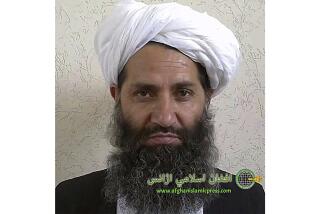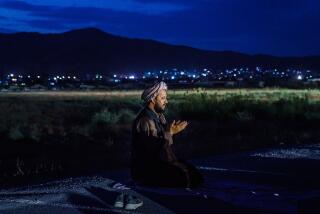Afghanistan president questions NATO mission in teary speech
- Share via
Reporting from Kandahar, Afghanistan — President Hamid Karzai broke into tears Tuesday while delivering a speech in which he questioned the efficacy of the NATO military mission in Afghanistan and condemning an epidemic of violence gripping his country.
In the same speech, the Afghan leader called on Taliban “compatriots” to lay down their arms. The government Tuesday named a nearly 70-member council to make peace overtures to the insurgency, whose leaders have rebuffed Karzai’s appeals to come to the bargaining table.
The presidential outburst was apparently prompted by the assassination of a deputy governor in Ghazni province, south of Kabul, which has become a hotbed of insurgent activity. A suicide blast aimed at the convoy of the deputy governor, Kazim Allayar, killed him and at least six other people, Afghan officials said.
Karzai’s office issued a statement condemning the attack, for which the Taliban claimed responsibility.
The president’s display of tears coincided with the release of a book by longtime Washington Post journalist Bob Woodward, who cited intelligence reports asserting that Karzai, known for his mercurial temperament, has been diagnosed as manic-depressive and is on medication.
However, emotional displays are not considered all that unusual in Afghan public life. Karzai has cried in public before when denouncing civilian casualties caused by Western troops, and the incident did not cause a particular stir.
Once a darling of the West, the Afghan leader has been under heavy pressure from the Obama administration and other NATO partners to clean up corruption in his government. Two of the president’s brothers, Mahmoud Karzai and Ahmed Wali Karzai, have come under scrutiny over their financial dealings.
Mahmoud Karzai, a U.S. citizen who divides his time among Afghanistan, the United States and Dubai, United Arab Emirates, is the subject of a federal corruption investigation by prosecutors in New York, the Wall Street Journal reported this week. Mahmoud Karzai, who also partly owns a troubled bank in Kabul, has denied any wrongdoing.
Ahmed Wali Karzai is the main power broker in Kandahar province, currently the scene of a North Atlantic Treaty Organization offensive that officials have described as potentially pivotal to the war’s outcome.
President Karzai became emotional during an address at an event in Kabul focused on improving literacy. Dwelling on Afghanistan’s more than 30 years of warfare, he recalled the Soviet era, alluded to meddling by Afghanistan’s neighbors and then added, “NATO is here, fighting against terrorism for 10 years, fighting with no result.”
The president’s eyes welled and his voice cracked when he expressed fears that young Afghans might choose to emigrate rather than live amid spiraling violence. He wept outright as he spoke of his son Mirwais, a preschooler born in 2007.
“I do not want Mirwais, my son, to be a foreigner.... I want Mirwais to be Afghan, to grow up in this land, to go to school here,” Karzai said. “I want Afghan teachers to teach him. I want him to grow up and become a doctor and serve his people, and be buried here.”
Addressing the Taliban directly, he said: “Do not destroy your country for the benefit of others. Do not kill your people for the benefit of others.... Any firing of a bullet is a shot in the heart of this country.”
The president spoke a day after U.S. Army Gen. David H. Petraeus, the commander of Western forces in Afghanistan, told reporters that the Karzai government has had contacts with the Taliban leadership. It was the most explicit assertion to date by such a senior American official that high-level contacts were taking place.
Presidential spokesman Waheed Omar, however, played down the significance of any back-channel talks to date.
“It’s just been contacts; there were no negotiations or understandings,” he said at a news conference in Kabul. But he said it was hoped that the newly appointed council would move ahead with efforts to lure Taliban foot soldiers away from the fight.
“There should be a specific address for those insurgents who want to desist from violence, and follow up on their social and political goals,” he said.
Western officials have said any Taliban militants taking part in talks with the government must renounce the armed struggle, cut ties with groups such as Al Qaeda and agree to respect the Afghan constitution, with its protection of women’s rights.
laura.king@latimes.com
More to Read
Sign up for Essential California
The most important California stories and recommendations in your inbox every morning.
You may occasionally receive promotional content from the Los Angeles Times.










